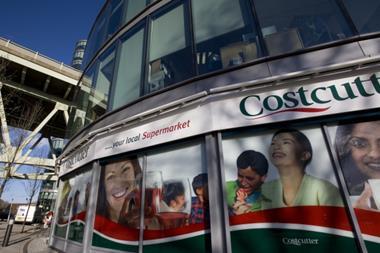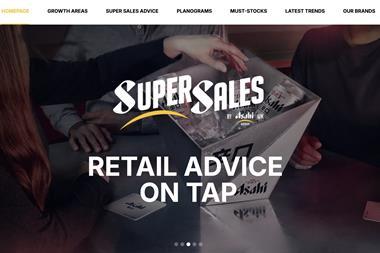Getting involved with your local schools can benefit the community and set you up for a sutainable future. Robin Mannering reports
In the current climate, with both a sluggish economy and the proliferation of multiple competitors to deal with, engaging with the local community is no longer just a nice thing for independent stores to attempt, it is essential for their ongoing success.
A recent poll by the Association of Convenience Stores under its Voice of Local Shops initiative found that 89% of retailers have engaged in some form of community activity, the highest proportion since the survey started in February. “Civic leadership through effective community engagement is absolutely essential to the success of modern convenience stores,” says ACS chief executive James Lowman.
And nowhere sits at the heart of the community more than schools. By earning the school’s trust and respect, you’re reaching out to children and their parents and in turn the shoppers - and staff - of today and tomorrow.
Syed Hussain, operations manager of London’s Sunstar Group, has helped cement the store group’s place in communities across the capital through his work with school children. “When I’m involved with the children I’m also involved with their parents,” he says. “People don’t realise that spending as little as £200 makes a huge difference - the whole community is friendly with you.”
Syed first got involved with schools after seeking to raise awareness of type two diabetes in the community.
“I arranged a workshop in South London, and invited the mayor of Southwark and the local school. I wanted to make a difference about a serious issue which is affecting more and more people,” he says.
He then found out about the Change4Life project, which aims to increase healthy eating and tackle obesity, and upgraded Sunstar’s fruit and veg offerings and staged in-store events for school children. “We also started raising awareness of healthy eating at local schools and offered free fruit and water at school sports days. We sponsored a school in Brentford and our staff gave pupils ingredients to make smoothies. Another time we organised a Fairtrade competition, in which pupils made vehicles and flying machines from fruit. The whole school turned up.”
It’s a win-win scenario which has educated the pupils and improved their eating habits, while also boosting sales. “As a result of these events, sales of fruit and veg have gone up, which means the quality has improved as we can go to the market every day for the freshest produce instead of every three days. The more you sell, the better the quality.”
Budgens Hassocks retailer David Knight has also gone down the educational route, with equally successful results. “It directly appeals to parents - they must have the buy-in too,” he says. “It’s not just about raffle prizes, it’s about education - the children are potential future customers. We want to educate them about the food they’re eating.”
David hosts practical demonstrations from local suppliers, such as sausage company Bangers Galore which showed pupils how they make sausages and compared it with supermarkets’ factory-made production methods. “I will never forget the horror on the children’s faces. It had a massive impact on the supplier’s sausage sales,” David says. Children at one local school designed ice cream flavours and helped make them at the supplier, a local farm, while in another project pupils collected apples to make local apple juice and the winners of a competition designed the bottle’s label.
David also gets involved with his local schools’ environmental clubs where he informs the pupils about his shop’s environmental performance, and sustainability issues in general. “We have a pack we put together which explains how much carbon our refrigeration and energy-saving lighting schemes save. I also point out facts about food sustainability, such as the fact we’re a net importer and don’t produce enough to sustain the population about food miles and wasted land and the dairy industry - which is pertinent at the moment and is a good example of how the food industry is out of kilter.”
The store’s commitment to schools has reaped tangible rewards, he says. “We made a concerted effort to target all three schools in the vicinity.
“As a result our shopper profile has changed and we’ve brought young mums in to the shop, which didn’t happen before. We have dialogue with them and many of them know us now. Since we started the practical events we’ve seen a footfall increase of 3-4%.”
Cambridgeshire retailer Jonathan James, of James Graven, has been involved with his local schools for years, and engages in fund-raising and educational initiatives. “It’s proper community retailing, but you have to work at it for so long,” he says. “It takes a while to earn people’s trust - they’re often sceptical about your agenda, but now that they know we enjoy doing it they never ask about our motives.”
One direct route to schools’ hearts is a voucher scheme which he has implemented in two of his stores, in Soham and Dersingham. Under the initiative, 10p is donated to the local school for every £10 spent over an eight-week period.
“We’ve raised up to £500 over the duration of the scheme, and the great thing is the schools can do what they want with the money - it isn’t ring-fenced for a particular area, which is so often the case,” says James Graven’s community liaison manager Caroline Bosworth. The store benefits too, she adds. “Basket spend increases during the scheme as people buy into the concept, and it’s a great way of earning press coverage. The schools would also promote the scheme in their newsletters, which is more publicity for us.”
James Graven has organised numerous events with local schools. “We’ll show pupils the journey from truck to shelf or the workings of a petrol station,” says Jonathan. “Local apple and pear growers came to the store once and the kids were fascinated by it.”
Jonathan doesn’t hesitate about the importance of his work with local schools. “These are the customers of the future so we’re laying down the foundations of what they believe in. It also means pupils will come and work for us when they’re older,” he says.
West Sussex Londis retailer Ramesh Shingadia invests heavily in the local Southwater primary school. “I sponsor the school newsletter which goes out to all parents and is also a good way of advertising our contribution to the community,” he says. “We sponsor the school carnival and supply food and drink at cost price or no price at all. We end up paying about £500 subsidy to the carnival.”
He also provides breakfast for the school meetings, held every three weeks and attended by all pupils and staff. He can’t put a figure on the benefit to his business, but it delivers in more ways than one.
“The newsletter and carnival posters have been productive at bringing people into the shop,” he says. “It’s hard to quantify the impact of our school initiatives on the business, but we recently applied for planning permission to extend the store and the parish council was supportive because of our commitment to the village.”
Pupil sponsorship has worked well for Norfolk retailer Nigel Dowdney. “We sponsored one child to go on a school trip to Kenya and we raised £1,000 - it had a great effect,” he says.
However, Nigel points out that engaging with local schools is also about addressing less savoury issues.
“I once caught one lad putting Mars Bars down his trousers, so I took him to the headmistress and asked him how many tins of baked beans it would take to replace them. She asked me to do an assembly on it and now kids come into the store and say: ‘How many tins of baked beans is this worth Nigel?’ They picked up on my name and now shoplifting from kids has gone down. They’re less likely to nick from you if they know your name,” he says. “I’m all for interacting with schools and getting to know them before they get into trouble.”
Syed agrees that kids will think twice about shoplifting once they know your name and face. “They realise we’re helping them so they don’t want to cause problems,” he says. “It’s all about communication. Misunderstandings are because of miscommunication, it’s the same all over the world and relates to race, religion, everything.”
David advises retailers who want to approach their local schools to use local products as part of their strategy. “You have to have a message there in the first place that you’re different.”
Jonathan agrees that a long-term commitment and constant re-invention are necessary to make your school project worthy of a gold star in the eyes of your community. “Don’t make it a one-hit wonder,” he says, “make it sustainable.” ■
































No comments yet